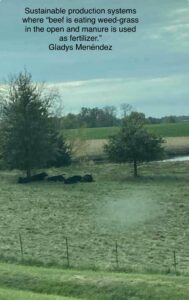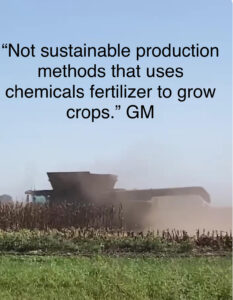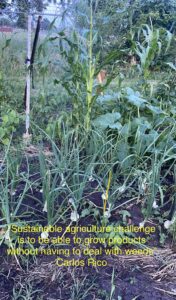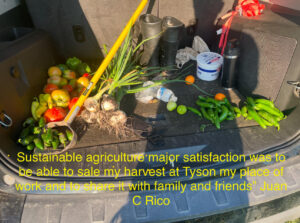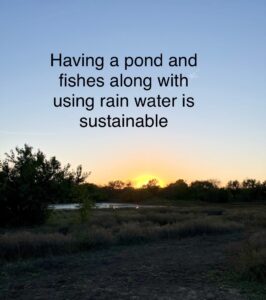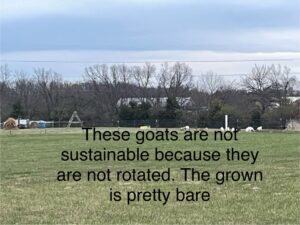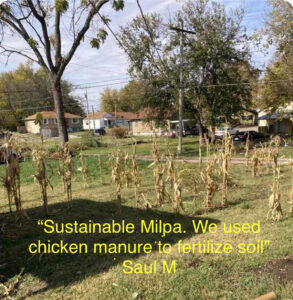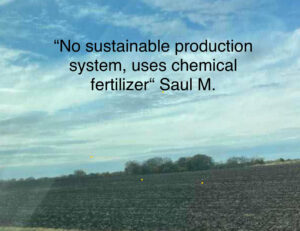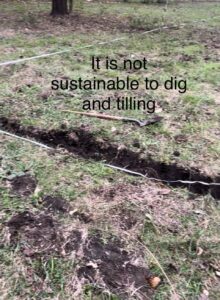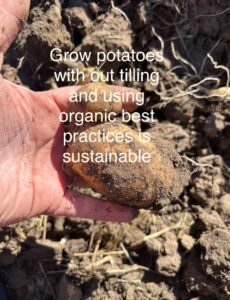Final report for LNC20-434
Project Information
According to the 2017 Census of Agriculture, the total number of farms in the U.S. declined 3.2 % from the Census of 2012. Latino farm owner-operators increased 16% going from 67,000 farms in 2012 to 77,416 farms in 2017. Latino farmers are the only ethnic minority group with a significant and consistent increase in number since the Census of Agriculture 2007. In Missouri, the number of Latino producers significantly increased (100%) from 548 to 1097 farm owner-principal operators. The Latino farmer's profile matches the predominant demographic profile of Missouri farmers. In general, in Missouri, 78% of farmers averaged had farm sales of $49,999 or less per year, and 65% of farms are of less than 179 acres.
This program builds on a recent NCR-SARE program (SARE project LNC15-368) among Latino producers in Missouri. In that program, a sample of 100 Latinx producers helped to document factors constraining them to practice sustainable agriculture. The study suggests that four challenges keep Latino producers in Missouri from practicing sustainable agriculture. Including; a) farm households incomes depend on off-farm sources, b) the existence of a socio-economic farm framework system influencing farmers to opt for conventional production methods, c) lack of knowledge and skills in agro-ecological practices, and d) poor understandings of financial and managerial skills needed to follow agribusiness plans.
The program Entrepreneurial Sustainable Agriculture for Latinx and Limited Resource Producers in Missouri aims to expand those findings with an additional approach to evaluate current sustainable production methods among Latino producers. It will use a convenient sample of 50 Latino producers and document the current levels of skills, knowledge, and attitudes toward partially and fully transitioning into sustainable and organic production methods supported by a mixed- methods analysis. Then, an enhanced Entrepreneurial Sustainable Education curriculum (ESA) https://projects.sare.org/information-product/entrepreneurial-sustainable-agriculture-esa/ will directly increase engagement, skills, attitudes, and knowledge of 30 Latino producers in sustainable agriculture and organic production methods. This program will create a Latino-producer advisory group to enhance farmer's participation and communication with program activities.
New skills, knowledge, and implementation of innovative and good agricultural practices will eventually reduce farm inputs, enhance the farm's natural resources, and increase the diversity of fresh produce food into local community markets.
- To increase the entrepreneurial, production and community capacities of Latino producers by educating producers and creating an advisory/mentor group of Latino producers.
- To implement sustainable production activities on Latino producers’ farms. Successful sustainable producer mentors will join in on gatherings that implement sustainable practices on farms.
- To train 30 Latino producers and we expect 20 to implement sustainable practices, including greenhouses, geothermal systems, and regenerative soil practices.
- To evaluate gains in knowledge, attitudes, skills and on-ground activities of 50 producers transitioning into organic and agro-ecological systems use.
The global agricultural industry continues to evolve in different production systems, where large farms mainly focus on conventional ways of production, while many small and medium farms continue developing interest in sustainable and organic production systems. Conventional systems use automatized technologies and require less labor-intensive needs because of economies of scale. On the other side, limited resource producers of sustainable and organic systems continue demanding intensive labor involvement to meet their production needs. However, sustainable farming innovations continue to motivate the resilience of these limited resource producers. Most Latino farmers and ranchers in the United States are limited resource producers but most of them are unaware of how to produce sustainably and organically. According to the 2017 Census of Agriculture in the U.S., seventy percent of Latino producers registered $10,000 or less in value of sales per year. This fact is also similar in Missouri where most producers diversify with livestock and crops in small plots of land. A recent NCR-SARE study (Gonzalez E. 2018) observed that more than 90% of the Latino producers interviewed (n=100) owned farms and ranches of equal or less than 50 acres and a high proportion of those owned 1 to 15 acres. After years of working with Latino farmers, we observed their resilience to remain in farming regardless, yet some complain how they must complement their farm needs with their outside farm income.
Cooperators
- - Technical Advisor
- - Technical Advisor
- - Technical Advisor
- - Technical Advisor
- - Technical Advisor
- - Technical Advisor
- - Technical Advisor
- - Technical Advisor
- - Technical Advisor
- - Technical Advisor
- - Technical Advisor
Research
The program used a cross-sectional analysis to evaluate current skills, knowledge, and awareness of sustainable production methods. We aim to use multivariate analysis to test the general hypothesis that Latinx farmers significantly increased the adoption of sustainable agriculture practices over time. A 2018 (time 1) database used with an NCR-SARE grant program will help this program estimate longitudinal effects in adopting and following sustainable production methods in time 2 (2022). We are testing multiple explanatory variables aligning with sustainable agricultural conservation practices, sustainable livestock grass management practices, and community agribusiness models encouraging local and regional food production systems. We also use qualitative methodologies to validate quantitative findings. Qualitative data was collected from photovoice methodology and two focus group interviews with 13 Latino producers. Qualitative data collected points of view and perceptions on sustainable production practices and participants' perceptions of involvement and inclusion in farm policies and actions that aim to increase sustainable farming resilience among minorities and socially disadvantaged groups. We also use a photovoice methodology to validate the hypothesis of whether or not Latino farmers observed a significant transition from the level of conventional farming practices to sustainable farming practices during the span of 4 years (2018-2022). According to our research methodologies in this report, preliminary findings show a positive change in the awareness, understanding, and implementation of sustainable practices among Latino farmers in Missouri.
The field research activities started with an outreach evaluation survey to assess knowledge, skills, and on-ground sustainable systems among 50 Latino producers in 2 regions of Missouri. This initial assessment is helping the program to have a before-program evaluation tool. The program also aims to enhance collaboration with the Missouri-Granjero Cooperative (MGC), where we have a network of Latino farmers. Data helps us to gain knowledge and promote training that aligns with sustainable agriculture.
In this first stage, using a mixed-methods approach, we collected data to assess current knowledge and on-ground activities among farmers. This mixed-methods approach consisted of a survey interview to collect cross-sectional data about awareness, skills, knowledge, and attitudes towards sustainable agriculture techniques. Simultaneously, we aim to use direct observation qualitative techniques while conducting face-to-face interviews. We also used photovoice techniques to cross information regarding their understanding of sustainable production systems. Additionally, we are using focus group interview data from 13 Latino farmers.
NVivo, SPSS, and Qualtrics software were used to gather data.
We have sent preliminary findings to different venues. Current working drafts are planned to be sent to the Animal Frontier Journal with a due date of May 1, 2025.
We used a survey to collect data from Latino producers regarding their points of view, perceptions, knowledge, and understanding of sustainable production methods. This report is a document with a basic description of statistical data to inform about the responses of Latino farmers. The survey was administered face-to-face to Latino peers. The survey duration Survey data Results_50_Latino ranges from 45 minutes to one and a half hours, depending on the level of understanding of the respondents to the questions.
We try to replicate surveys with the Latino farmers who previously responded to a previous study; that way, we can use data from the last poll to measure gain in skills and knowledge.
Given the large dataset and information we collected from the Latino community, we have widened our options to document Latino farmer's progress in sustainable agriculture. We are documenting Latino farmers' understanding and adoption of sustainable production methods. We are also writing an article to evaluate sociological factors related to diversity, equity, and inclusion and extension strategies to increase sustainable agriculture and bio-circularity practices among limited resource producers. A draft manuscript will be sent to the Animal Frontier Journal.
We have been actively defusing other preliminary findings on increasing sustainable agricultural practices among Latino farmers. Initial findings were presented at the 1890 research symposium celebrated April 6 to 9, 2024, in Nashville, TN. At the research meeting, we presented the paper titled: Broadband Access Among Latino Producers In Adopting Climate-smart Sustainable Agriculture And Connecting With High-paid Markets In Missouri. Sustainable Agriculture Latino Broadband access
Recently, an abstract that documents Missouri Latino farmers' involvement in food and society was submitted to the Association for the Study of Food and Society (ASFS) to participate in their annual meeting on June 18-21, 2025, in Corvallis, Oregon, USA.
INTERVIEW DATA MANUAL
The questionnaire seeks to capture the most Sustainable Agriculture practices and those socioeconomic factors that directly relate to helping farmers transition to integrate sustainable practices in their operations.
Data includes variable categories and related items from the database
- Sociodemographic variables
- Social networks and broadband access
- Sustainable production practices
- Economics of Sustainable Agriculture Production
- Social sustainability
Interview Data Manual of 50 farmers interviewed in 2022-2023 is added to the "Add Media" link. Latino_Data NCRSARE responses
This research report documents the levels of understanding, skills, and knowledge of Latino farmers in Missouri. We used descriptive statistics to document qualitative information that explains Latino farmers' levels of learning, awareness, skills, and knowledge in multiple categories.
Data includes variable categories and related items from the database
- Sociodemographic variables
- Social networks and broadband access
- Sustainable production practices
- Economics of Sustainable Agriculture Production
- Social sustainability
We have been analyzing a total of 218 variables in those five categories. Preliminary findings related to documenting Latino farmers' progress in adopting sustainable production practices on farms are in progress. Our team will present two topics from this database in the upcoming 1890 Research Symposium in April. One is a research poster where we document Latino farmers' perceptions of sustainable agribusiness plans (file attached). The second is an oral presentation of preliminary findings on "broadband access and use among Latino producers in adopting climate-smart sustainable agriculture and connecting with high-paid markets in Missouri." in this study, we evaluate how Latino farmers respond to broadband access and social media use to adopt sustainable farming methods and connect with local markets.
We also used qualitative methodologies to help validate and document findings from surveys. We used two focus groups that included 13 Latino farmers to collect their views and awareness of being able to interact socially with current levels of equity and inclusion in adopting resilient, sustainable practices to stay farming and ranching. Preliminary findings indicate that communication barriers and a lack of understanding of farm policies with a feeling of belonging might become barriers to fully integrating into the agricultural system. Latino group interview data transcrip_MO
We used photovoice methodology to collect final views and perceptions of sustainable production methods. We asked five Latino producers who attended the workshop training series to take landscaping pictures of sustainable and non-sustainable production practices; they were asked to write why the farming practice in the photo was sustainable. We analyzed their responses based on their description of the farming practice. We could differentiate and document via photos a positive understanding of the principles we taught about sustainable agriculture. A survey replication among those 30 farmers who attended sessions might show an increase in the knowledge and practice of sustainable agriculture among the Latino farming community in Missouri. Photovoice exhibit Photovoice of Latino farmers
Education
In the program's second stage, we offered a pilot workshop to instruct an Entrepreneurial Sustainable Education approach methodology developed in a previous NCR-SARE program. Our first training was delivered from October to December 2023. We trained 14 farmers in our pilot training. See our promotional flyer in Spanish and English. ESA_Edu_training_NCRSARE_2023
We continued with two workshop series in 2024. The training was in the Spanish language; all participants were Latino farmers. The program will offer an English translator as needed; most program personnel are bilingual, but some lecturers were supported with translation from English to Spanish. We follow a 4x4x4 learning-teaching model consisting of 4 in-room sessions, four farm visits, and four demonstration activities in sustainable practices. Demonstration activities were mainly performed during farm visits. Our second training was in the spring and summer time of 2024. We used social media to invite participants and direct referrals. ESA_Edu_training_NCRSARE_prim_Ver2024, a final workshop series, was offered during the fall and winter in central Missouri. Our last training session for the program was on November 10, 2024. ESA_Edu_training_NCRSARE_Sesions Fall24
2023- Pilot training
We refer to the pilot training as an event to increase our understanding of the farming community and evaluate the weaknesses and strengths of the educational activities we offer to farmers.
We evaluate the impact of the training using these tools.
- An end-of-session evaluation survey was collected at each training session (in-room and on-farm demonstrations).
- A 'before' and 'after' evaluation survey was included in the evaluation.
- A short open-question interview was offered to collect perceptions on training and program improvement.
This pilot training positively impacted the skills and knowledge gained by participants. Below are some evaluation indicators we collected from the 14 participants in the pilot training.
All participants were male, and most (57.1%) were older than 50.
1. Knowledge of Sustainable Agriculture before training and after training.
We used Likert scale evaluation questions to know the skills and level of knowledge gained after training. Forty-two % of responders reported increased skill, knowledge, and awareness of sustainable agriculture after training.
2. Knowledge of water management before and after training also showed a significant increase of 42.9 %, moving from poor to good skills and knowledge to "very good" knowledge.
3. Regarding their gain of knowledge on soil management, we also observed a significant increase (57.1%) moving up a scale from poor knowledge to very good knowledge after training.
4. knowledge and awareness of climate change was also evaluated. We observed a very positive response to these indicators; after training, eight farmers (57.1%) of the attendees reported an increased perception and knowledge of climate change.
Teaching narrative
As described in our methodology, we followed the Entrepreneurial Sustainable Agriculture educational approach, which allows us to alternate inside and outside educational activities. For instance, we conducted four in-room sessions and alternated farm visits and demonstration activities. We follow the proposed educational model of mixing classroom sessions, farm sessions, and on-farm activities demonstrations (4-4-4).
All sessions are designed to address the SARE principles of sustainability as follows:
In-room education. It includes the instruction of workshops over four in-class sessions. Information presented at each seminar might be adjusted to guarantee that producers receive the appropriate information to acquire the knowledge and skills to experience and learn about sustainable production methods. Instruction of sessions during the pilot training were as follows:
-
- Module One: Sustainable Agriculture
- Module Two: Access to community networks and agribusiness tools
- Module Three: Sustainable management of soil and water (climate change training approach)
- module Four: Business model for Sustainable Agriculture
Farm Visits
Due to the demographic profile of our farmers in the SW region of Missouri, where 100 % of farmers own animal species and a few combine gardening activities. We decide to have Middleton Natural Meat as the primary host. Middleton Natural Meat is a farm that uses all conservation and suitable practices for ranching and grazing. The Family farm has 160 acres of pastures with a very efficient rotational system. The farm practices direct meat marketing to sell beef and has innovated in marketing systems that sustain a direct connection with local community consumers. Consumer willing to buy their grass-feed system products needs to make orders months ahead due to the high demand for products and the programmatic way of channeling livestock to the butchering system. It is a business model that we were very triggered to get Latino farmers involved with.
- Farm visit one. Midleton All natural Meat farms
- Farm Visit Two. Manejo Sustentable de Praderas y Carga Animal en Potreros.
- Farm visit Three. Nutrición Animal y Manejo Sustentable de
Forrjes para el Primavera verano- toño-Invierno - Farm Visit Four: Implementación de Prácticas Sustenables.
On-farm demonstration activities
We selected four farmers to conduct activities on their farm, such as soil testing, cover cropping, and livestock paddock management. in addition, we collected among fifty Latino farmers 50 soil samples, each farmer is being educated on implementing soil management with sustainable/regenerative techniques. Soil samples generally showed very low pH levels, mainly because most farmers receiving soil samples are livestock producers and don't amend their soils or grow grass systems. Still, most don't have soil testing experience and were unaware of lime use to move soil pH to alkaline levels..
On-farm demonstrations. Four on-farm demonstrations exposed participants to sustainable practices. This first farm visit session mainly focuses on livestock producers' practices. On-ground implementation activities: On-farm demonstration activities help link Latino producers to on-ground implementation of sustainable farm practices. The program advisory made by co-principal investigators was supportive of on-ground implementation activities, farmers' mentors, and program personnel.
Summary: The educational approach proposed will mix three components: a) in-classroom sessions, b) on-farm demonstrations, and c) on-ground implementation of sustainable systems. Four in-class workshop sessions were taught during our pilot training on the updates and amendments of the curriculum in year one of the program. In-classroom sessions and on-farm demonstrations were hosted to help farmers enhance their understanding of sustainable agriculture and develop skills and knowledge on sustainable climate resilient practices such as cover cropping, drip irrigation, minimized tilling, grass pasture rotations, and stocking livestock. We helped farmers understand community involvement and engagement, and our community capital assessment of their farms helped increase their awareness of positive social interactions. We also expose farmers and instruct them on accessing conservation programs such as the NRCS-EQIP, RD, and FSA programs. We used promotila flyer to increase reach in pour targeted community.
Onsite and farm visits workshop series Carthage MO
2024 workshops series
Entrepreneurial Sustainable Agriculture - Workshop Series Two. ESA_Edu_training_NCRSARE_prim_Ver2024
We conducted the second educational training; our second workshop was offered in Carthage, MO., from May to July 2024. Flyers for this workshop series have been added to the media link. We successfully trained eight farmers who participated in room training, farm visits, and soil demonstration practices. We receive the support of Middleton Natural Meats, Patiño Farms, and Perez Farms to offer farm and ranch training on grass management, paddock rotations, electric fencing, and soil fertility practices. Farmers continue to gain awareness of sustainable climate-resilient practices. They learn new sustainable production practices, such as silvopastoral techniques, to introduce crops into their livestock production systems. We also introduce them to understanding how to adapt to weather uncertainty and stay sustainable; for instance, we introduce them to corridor cropping systems, a new technique to produce livestock forage intensively, such as cover cropping, while making cash crops such as corn and soybeans.
Entrepreneurial Sustainable Agriculture - Workshop Series Three. ESA_Edu_training_NCRSARE_Sesions Fall24
In our last training of the grant period, we focused on developing capacities for doing sustainable practices with specialty and horticultural crops. We have now solved many issues related to the best educational approach to educating Latino farmers and guiding them in implementing sustainable production systems. Similarly, we will be able to have a good number of applications filed at the NRCS-EQIP programs to receive grants to install high panel tunnels and other geothermal practices. We expect a lot of interest in these programs for Latino producers because of the link they create between training, accessing resources, and on-ground implementation of farming activities. Workshop two will teach another 10 Latino producers with the same educational approach used during workshop one training. The Latino Farmers' Advisory group will help to get other farmers involved in this region. We have already received the support and interest of Latino producers in attending the training offered in this program for the spring and fall. Our preliminary data analysts indicate a positive gain in skills and knowledge. In general, understanding sustainable agriculture practices before sessions and understanding of sustainable agriculture practices after sessions increase from very bad, more or less understanding to good and excellent understanding after training. We understand that this short knowledge gain might be influenced by how fast they use techniques in real-life farming. But generally, we observe positive feedback on our evaluations (files attached). We also evaluate farm visit experiences; in our survey assessment, participants in the farm visits were asked to what extent their learning experience was successful using a Likert scale, going from very poor to plenty of knowledge gained.
Training Evaluation
We evaluated the knowledge gained after each training session; we offered 16 in-room sessions and 16 farm visits during the funding period, where we collected data after each session. We received attendance from more than 30 participants during our training. We selected those 30 participants who were more recurrent to attend most of the in-room sessions and farm visits. To document sustainable agriculture skills and knowledge change, we selected those specific questions that helped evaluate sustainable agriculture knowledge gain and the extent to which participants perceived they gained knowledge when attending farm visits with determined specific sustainable production practices. Results can be accessed at this link Knowledgeimpactgain_Descriptivedata_training30
Project Activities
Educational & Outreach Activities
Participation summary:
At the beginning of year one, we developed research tools to document Latinx sustainable agriculture practices. We presented a virtual conference on Sustainable Agriculture to a Spanish-speaking audience.
Upcoming journal articles, publications, and presentations include:
- Developing article for community development society, "Broadband access and use among Latino producers in adopting and using sustainable agriculture production methods in Missouri."
- Guide sheet (co-sponsoring). Farm Assessment Capacity and Technology for Sustainable Agriculture. This guide was created to support the development of a farm assessment that allows for building a farm business model. FACTSA guide
- Guide Sheet (Co-sponsoring). Farm Sustainable Agribusiness Model (F-SAM). This tool is a short guide to writing a sustainable agriculture business model. It was created to support farmers' understanding of a business plan.FSAM_Farm Sustainable Agribusiness Model
- The extension paper draft, "LATINO FARMER PERCEPTIONS ON SUSTAINABLE AGRIBUSINESS PLANS," was presented at the 1890 research symposium in 2024.
- Draft article for the Animal Frontier Journal. "Extension strategies to increase bio-circular sustainable practices in small farmers"
Learning Outcomes
- Entrepreneurship in Sustainable Agriculture
- Social networks, social media access and agribusiness tools in sustainable agriculture
- Sustainable Water and Soil Management, cover crops, crop rotations, soil management and Natural Resources sustainability
- Business Models for Sustainable Agriculture in Small Farms and Ranches
Project Outcomes
Increase the use of natural amendments in soil
Cover crops
Minimize tilling
Composting
Seed selection and use
Pasture management
Soil testing
Direct Marketing
Local farmer market access
Crop rotations
Accessing market prices
Use of beneficial insects
There is a significant interest in this program, the initiative to offer soil testing to people who offered surveys increased their awareness on protecting their soil.
Continue with developing farmers capacity in sustaible production practices. we started increasing farmers understanding of climate change, and it has helped the program to increase awareness and interest for training.
